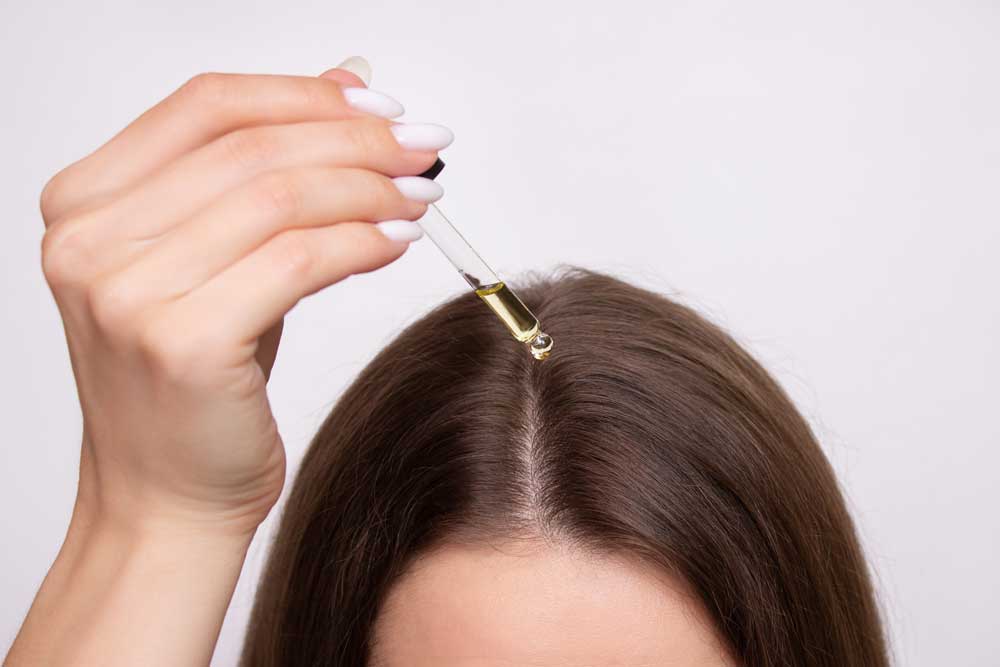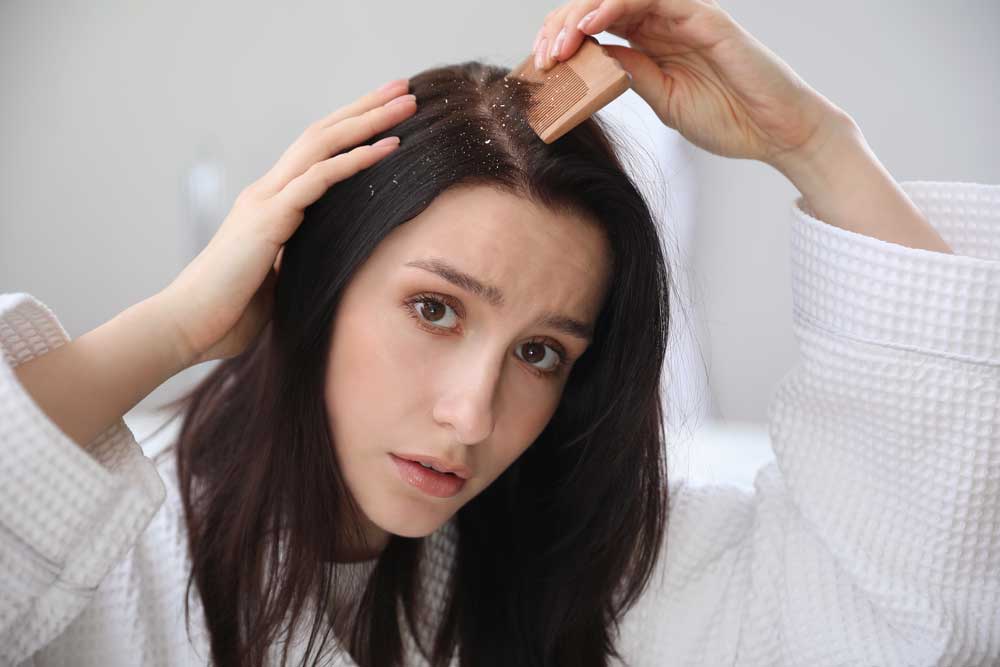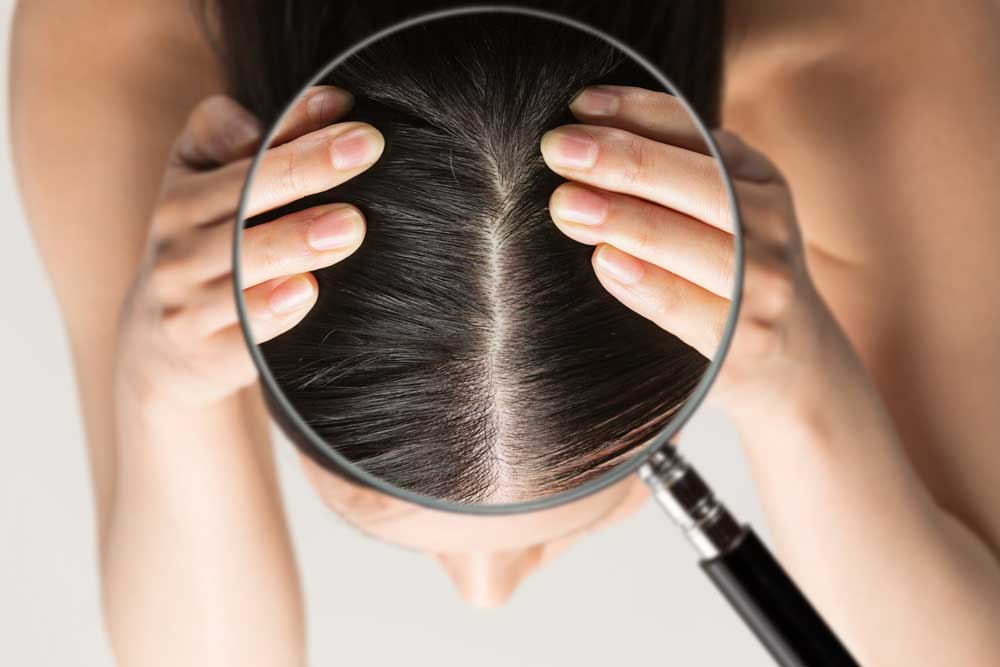This has probably happened to all of us at some point. Often our OOTD (Outfit Of The Day) is self-accessorised by tiny white flakes on our shoulders. It’s a dreadful turn of events, especially if one has decided to wear a dark coloured outfit. You dust off the flakes, but they magically reappear at exactly the same place. It’s a dreadful encounter, especially when you have to step out for an important occasion (where everything would be in place except for your dandruff making a guest appearance on your shoulders)!

There is a lot more to dandruff that we think. Yes, it can be annoying, but Dr Sonali Kohli, dermatologist and venereologist explains that it’s often the body’s distress signal, revealing underlying imbalances in gut health, the immune system, and one’s overall wellbeing. Dandruff occurs when your scalp’s natural cell turnover accelerates dramatically. While a healthy scalp sheds cells gradually and invisibly, a dandruff-affected scalp creates visible clumps of dead skin cells. Several factors contribute to this disruption:
The Microbial Imbalance
Contrary to popular belief, dandruff isn’t a result of poor hygiene. The primary culprit is often a yeast-like fungus called ‘Malassezia Globosa’. This organism exists naturally on everyone’s scalp, but in some people, it triggers an inflammatory response. Your body attempts to fight this perceived threat by accelerating skin cell production, resulting in those visible flakes.
The Oil Connection
Your scalp’s sebaceous glands produce an oil called sebum, which normally protects your skin. However, when these glands become overactive, the excess oil creates an ideal environment for Malassezia to thrive. This explains why dandruff often worsens during puberty, when hormonal changes increase oil production.
The Internal Landscape
What’s happening inside your body significantly affects your scalp’s health. Research increasingly links dandruff to:
Gut microbiome imbalances: The connection between your gut and skin health (known as the gut-skin axis) means that digestive issues often manifest as skin problems, including dandruff.
Immune system dysfunction: An overactive immune response can trigger inflammation throughout the body, including your scalp.
Nutritional deficiencies: Inadequate levels of zinc, B vitamins, and essential fatty acids can compromise your scalp’s health.
Those flakes aren’t just inconvenient—they’re informative. Dandruff often indicates:
Compromised Barrier Function
Your scalp, like the rest of your skin, forms a critical barrier against environmental threats. When dandruff appears, it suggests this barrier is compromised, potentially allowing irritants to penetrate and causing further inflammation.
Systemic Inflammation
Dandruff can be a visible symptom of body-wide inflammation. The same inflammatory processes that contribute to dandruff may also affect other systems, including cardiovascular and digestive health.

Stress Response
Your body’s stress response can directly impact your scalp health. Stress hormones like cortisol can trigger or worsen dandruff by disrupting your scalp’s natural balance and weakening your immune system.
Gut Health Indicators
The gut-brain-skin axis is a fascinating connection that scientists are still exploring. Emerging research suggests that dandruff may reflect imbalances in your gut microbiome, with improvements in intestinal health often leading to clearer skin and scalp. Many people notice worsening dandruff in winter when indoor heating reduces humidity.

Dietary factors: Consumption of high-sugar foods, processed carbohydrates, and certain dairy products can trigger inflammatory responses that manifest as dandruff. During particularly stressful periods, dandruff often flares up dramatically.
Product build-up: Some hair products create residue that disrupts your scalp’s natural balance.
Holistic Management Approaches
Truly effective dandruff management addresses both external symptoms and internal causes. Ingredients like zinc pyrithione, ketoconazole, and selenium sulfide can help control the Malassezia fungus.

Gentle exfoliation can remove build-up and promote healthier cell turnover. Tea tree, rosemary, and neem oils have natural antifungal properties beneficial for scalp health. Emphasising omega-3 fatty acids, antioxidant-rich foods, and probiotics can reduce systemic inflammation.
Addressing digestive issues often leads to improvements in scalp health – Zinc, B vitamins, omega-3s and probiotics may help address underlying deficiencies.

When Dandruff Signals Serious Skin Concerns
While regular dandruff is common, certain patterns may indicate more serious conditions requiring medical attention:
Seborrheic Dermatitis
Often confused with dandruff, seborrheic dermatitis presents as yellowish, greasy scales accompanied by significant redness and inflammation. This condition frequently affects other oil-rich areas like your eyebrows, sides of your nose, and behind your ears.
Psoriasis
Scalp psoriasis creates thicker, more defined silvery scales and can be accompanied by psoriasis elsewhere on the body. This autoimmune condition warrants specialised treatment approaches.
Fungal Infections
Beyond the common Malassezia, other fungal infections can cause dandruff-like symptoms but typically present with more severe inflammation and sometimes hair loss.
Neurodermatitis
This condition involves intense itching that leads to a scratch-itch cycle, resulting in thickened, scaly patches on your scalp. It’s often triggered by stress and anxiety.

What Your Dandruff History Reveals About Your Health
The Chronic Sufferer
If you’ve battled dandruff since adolescence, your body may be telling you:
- You have a genetic predisposition to increased oil production
- Your immune system tends towards heightened inflammatory responses
- Your skin barrier function may be constitutionally compromised
- Your gut microbiome might benefit from long-term rebalancing strategies
For chronic sufferers, a comprehensive approach addressing both symptoms and underlying causes is essential for managing this ongoing issue.
Those flakes on your shoulders aren’t just a cosmetic inconvenience—they’re messengers. Your dandruff is trying to tell you something important about your overall health, from your gut function to your stress levels and immune status.

By approaching dandruff as a health indicator rather than merely a cosmetic issue, you gain valuable insights into your body’s internal state. The next time you notice those tell-tale flakes, don’t just reach for a specialised shampoo. Consider what your body might be trying to communicate, and address both the symptoms on your scalp and their potential causes within.
Your scalp health reflects your overall well-being, and those seemingly insignificant flakes may be your body’s way of nudging you toward better balance — inside and out.